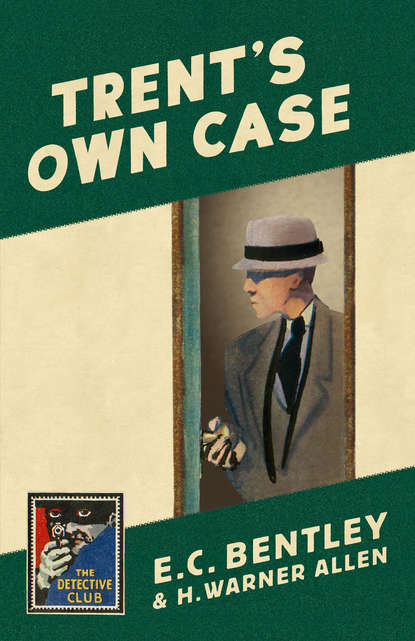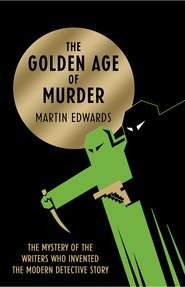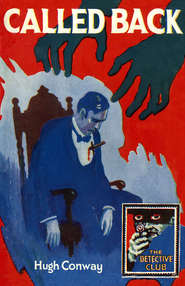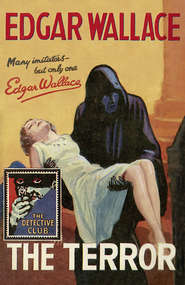По всем вопросам обращайтесь на: info@litportal.ru
(©) 2003-2024.
✖
Trent’s Own Case
Автор
Год написания книги
2019
Настройки чтения
Размер шрифта
Высота строк
Поля
INTRODUCTION (#u52dfecca-2132-58a0-8321-f15f3225d767)
FEW detective novels published during ‘the Golden Age of Murder’ between the two world wars were as eagerly anticipated by crime fiction enthusiasts as Trent’s Own Case. The book first appeared in 1936, and within months its publishers Constable felt able to boast that it was the best crime novel of the year—quite a claim given that the competition included Agatha Christie’s The ABC Murders, one of the enduring classics of the genre. Yet despite its initial success, the book has long been out of print.
Edmund Clerihew Bentley’s first novel, Trent’s Last Case (known as The Woman in Black in the US) had been published almost a quarter of a century earlier, in 1913. A journalist, Bentley (1875–1956) had been struck by the thought ‘that it would be a good idea to write a detective story of a new sort’. Although he admired the Sherlock Holmes stories, he was sceptical about the concept of the Great Detective, and soon ‘the most pleasing notion of all came to me: the notion of making the hero’s hard-won and obviously correct solution of the mystery turn out to be completely wrong. Why not show up the infallibility of the Holmesian method?’ The detective who proved all too human and error-prone was Philip Trent, a gentlemanly artist with a taste for amateur sleuthing. As the title of that first book suggests, Bentley had no thought of creating what is now known as a ‘series character’.
But Fate often conspires to defeat an author’s intentions. Trent’s Last Case was so well-written, and its plot twists so appealing, that people took it at face value as a highly entertaining country house murder mystery rather than as a parody. It became a best-seller, and was filmed. The legendary thriller writer Edgar Wallace hailed the book as ‘a masterpiece’, while Dean Inge, a prominent cleric and avid crime fiction fan, said it was ‘the best detective story I ever read’. After the First World War, when ingenious mystery novels packed with suspects, clues, red herrings and twists became all the rage, Bentley’s book inspired a new generation of writers, including Agatha Christie, Dorothy L. Sayers and Anthony Berkeley.
When Berkeley founded the Detection Club, a social network for leading detective writers, in 1930, Bentley’s lifelong friend G.K. Chesterton became the Club’s first President and Bentley was invited to become a founder member. Although he’d shown little appetite for building on the remarkable success of his debut, younger writers whom he’d influenced held him in high regard, and possibly it was encouragement from fellow Detection Club members that then helped to persuade Bentley to revive Philip Trent in a sequel.
Trent’s Own Case was, however, a collaborative work, and the person who did most to urge Bentley to return to the fray was his co-author, Herbert Warner Allen (1881–1968), a wine expert and occasional crime writer. It seems likely that the majority of the writing was done by Bentley, although Trent was not the only recurring character. Warner Allen’s own creation, the wine merchant William Clerihew, had appeared in ‘Tokay of the Comet Year’, a short story published in 1930, and also in the book Mr Clerihew: Wine Merchant three years later. Here a champagne cork supplies a clue which is discussed between Trent and Clerihew in one of the most appealing scenes in the book. The Clerihew name was a hat-tip to Bentley, who had, long before, devised the humorous four-line verse form known as the clerihew.
Trent’s Own Case concerns Trent’s investigation into the death of a philanthropist whose generosity towards charitable causes masks a deeply unattractive personality. The story is told in a leisurely, discursive style, but the writing offers a variety of incidental pleasures, and Trent’s return to the detection game after an extended absence is deftly explained:
‘It was long enough since he had resolved to have no more to do, in a quasi-professional way, with problems of crime. But the murder of a man whom he had known, and who had aroused his interest as a human curiosity, could not be disregarded; and the utterly unexpected appearance of an old friend in the character of the self-confessed criminal had given the keenest edge to Trent’s reviving taste for that grimly fascinating business.’
Writing to ‘Jack’ Bentley (as he was known to his friends) on 17 April 1936, before the book was published, Dorothy L. Sayers was rhapsodic: ‘I was just savouring the way the story was told and submitting to the spell of beautiful writing … nothing about a book is so unmistakeable and irreplaceable as the stamp of a cultured mind … all your figures get cheerfully up and walk out of the tapestry and talk and eat and move about in three dimensions, as if it was the simplest matter in the world. It’s not, of course, but you have the enormous advantage … of knowing, in the fullest sense of the words, how to read and write.’
The book’s publication, by Constable and Company, was celebrated at a private gathering, ‘The Trent Dinner’, on 21 May 1936. Most of the guests were members of the Detection Club: Sayers, Henry Wade, Freeman Wills Crofts, Milward Kennedy and Nicholas Blake. The novelist Frank Swinnerton, who was quoted on the back cover of the dust jacket as saying that Trent’s Last Case was the finest long detective story ever written, was also present; so were the publisher Michael Sadleir and his secretary, Martha Smith. But Chesterton, whom Bentley had met when they were boys at St Paul’s School, was missing; his health had given way, and he died on 14 June.
Bentley succeeded Chesterton as President of the Detection Club and, having written a handful of short stories about Trent more than two decades earlier, produced several more, which were gathered in Trent Intervenes and published by Thomas Nelson in 1938; Constable meanwhile published Warner Allen’s new murder story The Uncounted Hour. The Second World War put an end to Trent’s career once and for all, and although Bentley published one post-war thriller, Elephant’s Work (1950), it was not a success. His health declined, and he gave up the Presidency of the Detection Club in favour of Sayers. After the war, Warner Allen became a good friend of T.S. Eliot, despite Eliot’s decision to reject one of his thrillers: ‘The plot is extremely ingenious and involved, but I think that it moves too slowly, and especially that it is very slow indeed in starting.’ In his later years, Warner Allen’s publications mostly concerned wine.
The critics were kind to Trent’s Own Case. Torquemada, the Observer’s influential crime reviewer, was lavish in his praise, as were Milward Kennedy in the Sunday Times and Anthony Berkeley (under the name Francis Iles) in the Daily Telegraph. Later, the often acerbic Jacques Barzun and Wendell Hertig Taylor said in A Catalogue of Crime: ‘The problem is gripping and its solution good solid work’, and reckoned that it did not fall too far short of its legendary predecessor. In time, however, a reaction set in, which perhaps explains why the book has been absent from the shelves for so long. Bentley’s son Nicolas, a distinguished artist and himself an occasional crime writer, regretted that his father had allowed Warner Allen to talk him into producing the sequel. Inevitably, the story could hardly match Trent’s Last Case for originality or impact—very few books could. However, republication in the Detective Story Club now gives twenty-first century readers a welcome chance to judge this novel on its own merits.
MARTIN EDWARDS
January 2017
CHAPTER I (#u52dfecca-2132-58a0-8321-f15f3225d767)
SOUTHWARD BOUND (#u52dfecca-2132-58a0-8321-f15f3225d767)
‘I OUGHT to be going,’ Philip Trent said. ‘I’ve got an appointment, as I told you, and I mustn’t be late. You go on dining, Slick—have some of the crevettes Waldorf; they will bring the roses into your cheeks. If I come round with the car tomorrow about ten, will you be more or less ready?’
‘Less, I expect,’ Slick Patmore grumbled. ‘That is, if this ghastly weather doesn’t change in the night. A two-hours’ run through drizzle and chill is not my idea of a morning’s pleasure.’
‘It’s bound to change in the night,’ Trent assured him. ‘The only question is how many times it will change. That’s the exciting thing about a variable climate like ours; and it is at its best in April, as everybody knows. Oh to be in England, now that April’s there, and whoever wakes in England is entirely unaware whether it is going to rain cats and dogs or be gay with sunshine, birds and blossoms. Besides, it isn’t a question of pleasure for you and me tomorrow. It is duty, Slick, duty whose stern behest impels us to the deed of going to see Julian Pickett married.’
‘And drink his health in what old Blinky Fisher imagines to be champagne,’ Patmore added, moodily helping himself to another glass of La Tour–Figeac.
‘Why shouldn’t he have an imagination, just because he is a Canon of Glasminster?’ Trent asked. ‘He’ll need it, I should say, when he gives away his niece to Julian, and has to pretend that he has some sort of responsibility for a girl of the present time. Ha! I can see it now. “Who giveth this woman?” Come on, Blinky; to what green altar, O mysterious priest, lead’st thou that heifer? Probably he will have mislaid his spectacles, and will try to give Julian away.’
‘Didn’t you say you had an appointment?’ Patmore hinted.
Trent, descending the staircase of the Cactus Club, stood in the doorway and lighted a cigarette as he nerved himself to the task of going to see his favourite aunt off on the boat-train to Newhaven. It is a part of our island heritage, he mused, that at such times as we are on the point of leaving the country the weather is usually pretty beastly. As God tempers the wind to the shorn lamb, so the Briton about to uproot himself from the native soil is upheld and solaced by the thought that the climate he is going to cannot possibly be so objectionable. An erroneous thought, perhaps; but what thoughts (he asked himself) are not so? This particular evening, at least, was quite noxious enough to warrant the rosiest anticipations of what it was going to be like anywhere across the Channel. Fortunate indeed was Aunt Judith!
As he looked out across Piccadilly, the air was full of a yellowish drizzle that had not character enough to be a fog. Behind the Green Park railings the trees showed vague drab outlines suggesting the scenery of a hell where the ache of dull depression reigned rather than any pain. Everywhere was that thin and scanty slime which modern cities dignify by the noble name of mud.
Trent glanced at the clock in the porter’s office. He had told Patmore the truth, and nothing but the truth; not the whole truth, which, after all, nobody ever tells, if only because there is not time. He had an appointment, and he must not be late, since the 8:20 from Victoria waited for no man; but the fact that he intended to be there a quarter of an hour beforehand, and the reasons for that decision, would not have interested his friend. Although Trent had, like most of us, a strong distaste for prolonged farewells, he knew that Aunt Judith expected the decent observance of any social rite; and fifteen minutes appeared to him to hit the happy mean between the over-assiduous and the perfunctory. During the brief drive to the station he might tax his brain—fond hope!—for some happy and original form of good-by.
As he buttoned his overcoat, the slamming of the door of a motor-car came from without. The swing-door of the entrance was pushed half open, and a tall man, roaring with laughter, paused with his foot on the threshold, and spoke over his shoulder. ‘Gute Nacht, du alte gute Kerl,’ he called, ‘und herzlichen Dank.’
‘Ach Quatsch!’ a harsh voice barked in reply as the car rolled away. ‘Wiederseh’n!’
The new comer pushed through the doors and moved with long strides across the hall. Trent knew the man well enough; so well as to want no conversation with him. A completely unashamed and unscrupulous egotist is not as a rule the best of company, even if one has not, as Trent had, a personal reason for objecting to his existence. There was, too, always the strong possibility that Eugene Wetherill would not try to be the best of company. The habits of that brilliant man of letters included a tendency to be gratuitously offensive, and Trent had had more than one unpleasant encounter with him before.
Turning his head as he reached the stairway, Wetherill caught sight of Trent and raised a hand in recognition. ‘You’re looking damnably serious,’ he observed with a wolfish grin. ‘It isn’t the sight of me, I hope, that has banished the winning smile. Forget your trouble, dear friend. All may yet be well. Forget our little disagreements in the past. Drown your sorrow with me at the bar—it’s astonishing what a lot can be drowned in one small absinthe cocktail.’
‘Thanks, but I’ve got to go,’ Trent said. He added, ‘You don’t look as if you had anything much to drown. If I look serious, you look quite pleased.’
‘So I am.’ Wetherill laughed as he removed his broad-brimmed black hat and white scarf so that it could be seen he was in evening dress beneath his overcoat. ‘Much pleased. Nothing to drown, as you remark with that infallible discernment of yours; so I shall have that drink purely as a matter of principle—not with any sordid utilitarian purpose. Pleased! I should think I am pleased. I did a good stroke of business yesterday, dear friend, and I haven’t got over it yet.’ He paused a moment, as if recollecting himself; then he went on: ‘Whenever that happens, I have an unreasonable impulse to forgive the world for being what it is, and mankind for being what they are.’
‘Including Eugene Wetherill, I hope,’ Trent suggested sympathetically. ‘You ought not to be too hard on yourself, you know—it’s a fatal tendency. Fight it. Don’t let it master you. I’ve got to tear myself away now, but remember my words.’ He hurried through the doorway and down the greasy pavement in the direction of Piccadilly.
Wetherill, he thought, was certainly in a state of high satisfaction about something. The expression of contempt which he usually wore was probably, like all the rest of his external appearance, a carefully studied effect; but this evening it had yielded place to a look of genuine pleasure, and Trent wondered what might be the cause of it. Anything that pleased Wetherill would be quite likely to have a very different effect upon more normal minds; and Trent happened to know—as a good many people, unfortunately, knew—of one stroke of business done by Wetherill with which few men would have cared to soil their hands. But that had been months ago; this was evidently something recent, and it was curious that Wetherill had plainly hesitated to say what it was. He was anything but secretive as a rule about his own affairs, even the most discreditable; he liked posing as a paragon of immorality. It was difficult to reckon with a man who boasted of having destroyed his own self-respect.
A massive policeman loomed up at the corner of Charles Street.
‘Not a nice night, Officer,’ Trent remarked.
‘That it isn’t, sir,’ rumbled the constable in a tone suggesting that the grimy mist had found its way beneath his heavy water-proofs and permeated all his being. ‘There’s some that seem to enjoy it, though. See those runners coming up the other side of the way? Gawd! Sooner them than me. Funny amusement, isn’t it, sir, on a night like this?’
‘Splendid for them, really,’ Trent said. ‘When they’ve had a rub down and a change they’ll be as happy as so many kings of the Persians. It is youth, Officer—youth footing swift to the dawn, or to the Polytechnic, or somewhere delightful. We ought to envy them.’
Pushing on past the scattered procession of bedraggled lads in shorts and singlets who were jogging along in twos and threes at the edge of the pavement, Trent found the cab-rank he sought.
As he sat in the taxi, Trent’s thoughts turned back to the interview with old James Randolph which had preceded his dinner at the Cactus Club. It had been, he reflected, shorter than he had anticipated; shorter and even more unpleasant. Nobody could be expected to enjoy the discovery that one of his secrets, and a decidedly humiliating one at that, was shared by another person not at all well disposed towards him. Still, Randolph’s uncontrollable rage had seemed rather excessive for the occasion; he stood, after all, to lose nothing in either purse or repute so long as he behaved himself. And as to that there could be no doubt. Trent’s threat of exposure had obviously been quite effective. Whether Randolph’s denials of any dishonourable purpose were sincere or not, the man was certainly frightened now, and would conduct himself accordingly. Any scandal about the Tiara of Megabyzus would be a deadly blow to the old man’s inflated self-esteem. In short, Aunt Judith could be fully reassured before she left. If she were to do so with any remaining uneasiness about Eunice, it would spoil the trip to which she had looked forward so eagerly.
All his life Trent had been strongly attached to his aunt, that unusual old lady. This was a great moment in the life of Miss Judith Yates. She was leaving England for the first time in nearly forty years. Brought up in the twilight of the Victorian era, she had seen in her youth not a little of the world abroad; but the time had come when an over-confident brother had flung away most of the family fortune in some concern floated by a yet more hopeful financier. Thenceforward she had lived in the country on very small means, uncomplaining—indeed, singularly happy. She kept in touch with a wide circle of friends, many of them moving in the midst of affairs; she heard all that was made public, and a good deal that was not, of the world’s events, and the seamy side of high life and politics was pretty well known to her. Her prim appearance masked an exceedingly active, well-furnished and seasoned mind. Sometimes, to her amusement, modern young women imagined that they had shocked her; actually, Miss Yates in her time had contemplated with calm breaches of convention more startling than anything coming within their philosophy. She asked only that there should be something about the trespass that was worth considering; it was at pettiness and worthlessness that she drew the line. The closest bond of affection in her life, indeed, was a friendship, quite casually begun, with Eunice Faviell, the most brilliant of the younger generation of actresses, whose private history centred in a liaison that was no secret to the world she lived in.
A few months earlier she had come into a legacy, and had decided at once to see something, while health remained to her, of the European world again. ‘I mean,’ she had told Trent, ‘to travel in luxury, and to go on travelling until the money is spent.’ The journey now in prospect was a visit to friends in Rome, and she had declared herself as excited as when she went to her first dance, ready to savour every moment and every incident …
It was by a chance that she was taking the Dieppe route. She had meant to enjoy the comforts of the shorter crossing; but as it happened, a commission that she had given to her nephew Philip could not be carried out until the evening of her day of departure. So, with memories of having been a good sailor, she had decided to take the night service.
It was this errand that had taken Trent to his acrimonious interview with James Randolph; and he was reviewing now, as the taxi took him to Victoria, the grounds of his conviction that the job had been well and truly done. Aunt Judith, he knew, had eyes of the sharpest, and would guess only too readily that all was not well if he showed any sign of uncertainty.
Arrived at the terminus, with a little more margin of time than he had planned, he proceeded to the boat-train platform, stopping by the way to make a purchase at the flower-shop within the precincts. To his surprise, Aunt Judith was not to be seen. She had, of course, her place reserved; but Trent, knowing well her habits of mind, and knowing too that it was the first time in her life that she would be travelling in a first-class Pullman, had assumed that the longer she took over the preliminaries the greater her pleasure would be.
As he turned back, however, from his search for a non-existent Pullman in the forward end of the train, he saw his aunt supervising the transfer of hand luggage to a seat in a rearward section. She must have followed close upon his footsteps through the barrier. As he approached, she was conferring with the Pullman attendant, and that occupational optimist was giving a favourable view of the prospect for the Channel crossing. Trent presented his tribute of exuberant carnations.
‘Oh! That is kind of you, Philip. My favourite flower! And exactly what was wanted for the finishing touch to this stage of the adventure. My dear, you cannot imagine how I feel about it. Everything is so different from what it used to be—I mean everything in the way of getting abroad.’ Aunt Judith certainly appeared to be enjoying to the full the excitement that she had tasted in anticipation. Her eyes were bright, and her cheek had an unaccustomed flush.
Trent came at once to the point that was uppermost in his mind. ‘You will be glad to hear that it is all settled about Eunice. I saw Randolph this evening, as I had arranged, and I made quite sure that he won’t trouble her again. You know, Aunt Ju, I could see you didn’t feel quite confident about it when I told you I knew how to get a really binding promise out of the old man. Well, that is what I’ve done; you can set your mind at rest. I couldn’t explain to you how I was going to manage it, and I can’t now. I told him, you see, that I would keep quiet about it, as long as he lived at least; it was a bargain. But it’s all right.’
‘It is such a relief to know that, Philip.’ Miss Yates buried her nose in the carnations gratefully. ‘You are quite right, I couldn’t help being a little worried until it was quite certain.’
‘All the same,’ Trent went on, ‘it looks as if I am booked for a bit of a row with Eunice about it. It seems you wrote to her saying you had told me what had been going on, and you were letting me loose on the old man. She doesn’t like it. I got a note from her yesterday, and it wasn’t a nice note, though knowing what she is it didn’t altogether surprise me.’
There was a slight but perceptible elevation of Miss Yates’s chin. ‘What do you mean, Phil, by knowing what she is?’










